| Listing 1 - 10 of 15 | << page >> |
Sort by
|
Book
ISBN: 9781412961042 1412961041 Year: 2009 Publisher: Los Angeles: Sage,
Abstract | Keywords | Export | Availability | Bookmark
 Loading...
Loading...Choose an application
- Reference Manager
- EndNote
- RefWorks (Direct export to RefWorks)
Book
ISBN: 0813383099 9780813383095 Year: 1991 Publisher: Boulder (Colo.): Westview press,
Abstract | Keywords | Export | Availability | Bookmark
 Loading...
Loading...Choose an application
- Reference Manager
- EndNote
- RefWorks (Direct export to RefWorks)
Sociology of law --- Sociological jurisprudence --- Judicial process --- Pragmatism --- Constitutional law --- Pragmatisme --- Droit --- --3321 --- --Droit --- --Sociology of law --- Judicial process - United States --- Constitutional law - United States
Book
ISBN: 0195061411 9780195061413 Year: 1990 Publisher: New York (N.Y.): Oxford university press,
Abstract | Keywords | Export | Availability | Bookmark
 Loading...
Loading...Choose an application
- Reference Manager
- EndNote
- RefWorks (Direct export to RefWorks)
Đ 9202 --- Prisons --- Correctional law --- Judicial process --- Law and legislation --- Prisons - Law and legislation - United States --- Correctional law - United States --- Judicial process - United States
Book
ISBN: 086733052X 9780867330526 Year: 1983 Publisher: Port washington: Associated faculty press,
Abstract | Keywords | Export | Availability | Bookmark
 Loading...
Loading...Choose an application
- Reference Manager
- EndNote
- RefWorks (Direct export to RefWorks)
Criminal law. Criminal procedure --- United States --- Criminal procedure --- Judicial discretion --- Judicial process --- Prosecution --- Decision making --- Criminal procedure - United States --- Judicial discretion - United States --- Judicial process - United States --- Prosecution - United States - Decision making --- United States of America
Book
ISBN: 0674933559 9780674933552 Year: 1969 Publisher: Cambridge (Mass.): Harvard university press,
Abstract | Keywords | Export | Availability | Bookmark
 Loading...
Loading...Choose an application
- Reference Manager
- EndNote
- RefWorks (Direct export to RefWorks)
Private law --- Legal theory and methods. Philosophy of law --- United States --- Torts --- Judicial process --- Law reform --- Torts - United States --- Judicial process - United States --- Law reform - United States --- United States of America
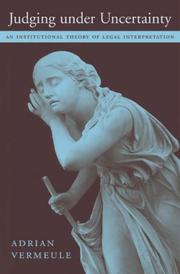
ISBN: 0674022106 9780674022102 Year: 2006 Publisher: Cambridge: Harvard university press,
Abstract | Keywords | Export | Availability | Bookmark
 Loading...
Loading...Choose an application
- Reference Manager
- EndNote
- RefWorks (Direct export to RefWorks)
Legal theory and methods. Philosophy of law --- United States --- Judicial review --- Law --- Judicial process --- Interpretation and construction --- Judicial review - United States --- Law - United States - Interpretation and construction --- Judicial process - United States --- Etats-Unis --- United States of America
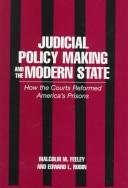
ISBN: 0521593530 0521777348 9780521593533 Year: 1998 Publisher: Cambridge: Cambridge university press,
Abstract | Keywords | Export | Availability | Bookmark
 Loading...
Loading...Choose an application
- Reference Manager
- EndNote
- RefWorks (Direct export to RefWorks)
Judicial process --- Political questions and judicial power --- Prisons --- Law and legislation --- Processus judiciaire --- Politique et pouvoir judiciaire --- Droit --- Prisons - Law and legislation - United States --- Judicial process - United States --- Political questions and judicial power - United States
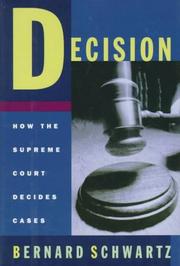
ISBN: 0195098595 0195118006 9780195098594 Year: 1996 Publisher: New York (N.Y.): Oxford university press,
Abstract | Keywords | Export | Availability | Bookmark
 Loading...
Loading...Choose an application
- Reference Manager
- EndNote
- RefWorks (Direct export to RefWorks)
Judicial process --- Processus judiciaire --- United States. --- Etats-Unis. --- -United States. Supreme Court --- -Decision making, Judicial --- Judicial behavior --- Judicial decision making --- Judges --- Law --- Procedure (Law) --- Psychological aspects --- Interpretation and construction --- United States. Supreme Court --- Judicial process - United States --- Supreme Court of the United States
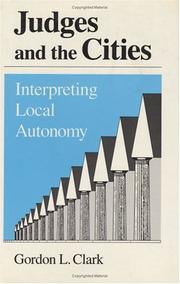
ISBN: 0226107531 9780226107530 Year: 1985 Publisher: Chicago (Ill.): University of Chicago press,
Abstract | Keywords | Export | Availability | Bookmark
 Loading...
Loading...Choose an application
- Reference Manager
- EndNote
- RefWorks (Direct export to RefWorks)
Local government --- Social institutions --- Social structure --- Urban policy --- Autonomy --- Judicial process --- Law and legislation --- Autonomy. --- Interpretation and construction. --- Interpretation and construction --- Local government - United States --- Social institutions - United States --- Social structure - United States --- Urban policy - United States --- Judicial process - United States --- Local government - Law and legislation - United States
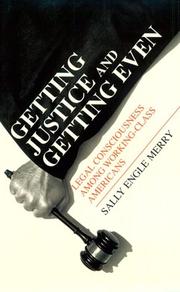
ISBN: 9780226520698 0226520684 0226520692 Year: 1990 Publisher: Chicago (Ill.): University of Chicago press,
Abstract | Keywords | Export | Availability | Bookmark
 Loading...
Loading...Choose an application
- Reference Manager
- EndNote
- RefWorks (Direct export to RefWorks)
Ordinary Americans often bring family and neighborhood problems to court, seeking justice or revenge. The litigants in these local squabbles encounter law at its boundaries in the corridors of busy city courthouses, in the offices of court clerks, and in the church parlors used by mediation programs.
"Getting Justice and Getting Even" concerns the legal consciousness of working class Americans and their experiences with court and mediation. Following cases into and through the courts, Sally Engle Merry provides an ethnographic study of local law and of the people who use it in a New England city. The litigants, primarily white, native-born, and working class, go to court because as part of mainstream America they feel entitled to use its legal system. Although neither powerful nor highly educated, they expect the law's support when they face intolerable infringements of their rights, privacy, and safety. Yet as personal problems enter the legal system and move through mediation sessions, clerk's hearings, and prosecutor's conferences, the citizen plaintiff rapidly loses control of the process. Court officials and mediators interpret and characterize the meaning of these experiences, reframing and categorizing them in different discourses. Some plaintiffs yield to these interpretations, but others resist, struggling to assert their own version of the problem.
Ultimately, Merry exposes the paradox of legal entitlement. While going to court allows an individual to dominate domestic relationships, the litigant must increasingly yield control of the situation to the court that supplies that power.
Law --- Judicial process --- Dispute resolution (Law) --- Sociological jurisprudence --- Cases --- Sociological jurisprudence. --- Processus judiciaire --- Socialisation juridique --- Règlement de conflits --- Cases. --- Social stratification --- Sociology of law --- Law - United States --- Judicial process - United States --- Dispute resolution (Law) - United States --- Law - New England - Cases --- Règlement de conflits
| Listing 1 - 10 of 15 | << page >> |
Sort by
|

 Search
Search Feedback
Feedback About UniCat
About UniCat  Help
Help News
News